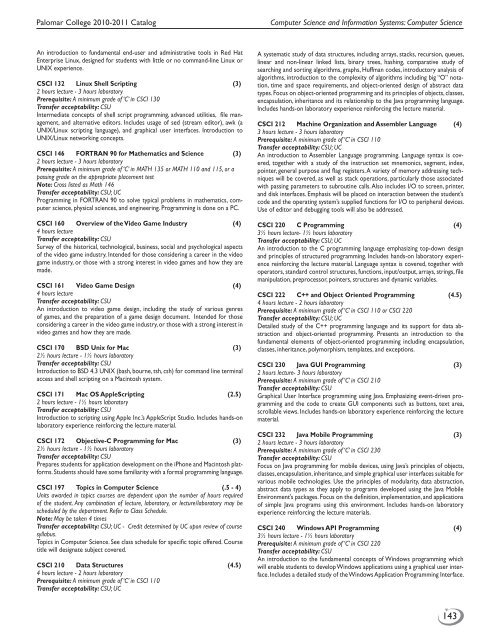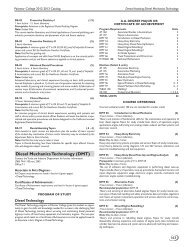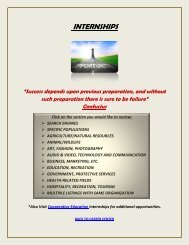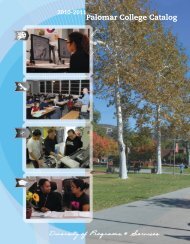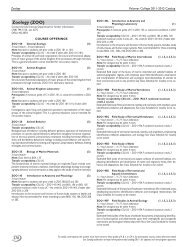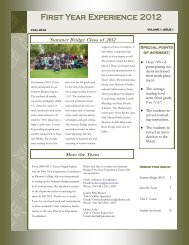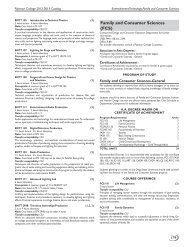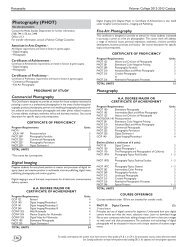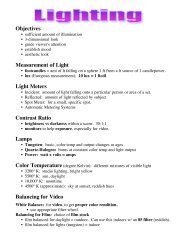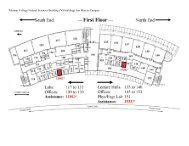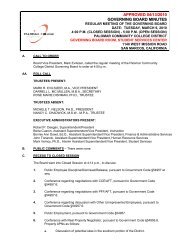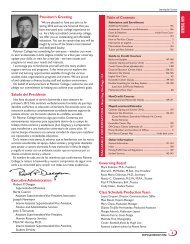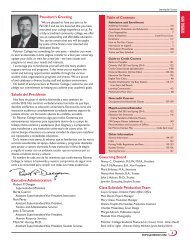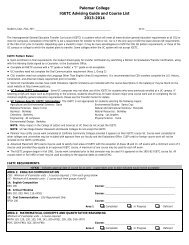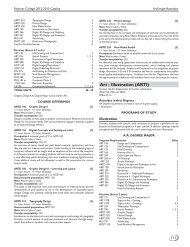Download the complete catalog - Palomar College
Download the complete catalog - Palomar College
Download the complete catalog - Palomar College
Create successful ePaper yourself
Turn your PDF publications into a flip-book with our unique Google optimized e-Paper software.
<strong>Palomar</strong> <strong>College</strong> 2010-2011 Catalog<br />
Computer Science and Information Systems: Computer Science<br />
An introduction to fundamental end-user and administrative tools in Red Hat<br />
Enterprise Linux, designed for students with little or no command-line Linux or<br />
UNIX experience.<br />
CSCI 132 Linux Shell Scripting (3)<br />
2 hours lecture - 3 hours laboratory<br />
Prerequisite: A minimum grade of ‘C’ in CSCI 130<br />
Transfer acceptability: CSU<br />
Intermediate concepts of shell script programming, advanced utilities, file management,<br />
and alternative editors. Includes usage of sed (stream editor), awk (a<br />
UNIX/Linux scripting language), and graphical user interfaces. Introduction to<br />
UNIX/Linux networking concepts.<br />
CSCI 146 FORTRAN 90 for Ma<strong>the</strong>matics and Science (3)<br />
2 hours lecture - 3 hours laboratory<br />
Prerequisite: A minimum grade of ‘C’ in MATH 135 or MATH 110 and 115, or a<br />
passing grade on <strong>the</strong> appropriate placement test<br />
Note: Cross listed as Math 146<br />
Transfer acceptability: CSU; UC<br />
Programming in FORTRAN 90 to solve typical problems in ma<strong>the</strong>matics, computer<br />
science, physical sciences, and engineering. Programming is done on a PC.<br />
CSCI 160 Overview of <strong>the</strong> Video Game Industry (4)<br />
4 hours lecture<br />
Transfer acceptability: CSU<br />
Survey of <strong>the</strong> historical, technological, business, social and psychological aspects<br />
of <strong>the</strong> video game industry. Intended for those considering a career in <strong>the</strong> video<br />
game industry, or those with a strong interest in video games and how <strong>the</strong>y are<br />
made.<br />
CSCI 161 Video Game Design (4)<br />
4 hours lecture<br />
Transfer acceptability: CSU<br />
An introduction to video game design, including <strong>the</strong> study of various genres<br />
of games, and <strong>the</strong> preparation of a game design document. Intended for those<br />
considering a career in <strong>the</strong> video game industry, or those with a strong interest in<br />
video games and how <strong>the</strong>y are made.<br />
CSCI 170 BSD Unix for Mac (3)<br />
2½ hours lecture - 1½ hours laboratory<br />
Transfer acceptability: CSU<br />
Introduction to BSD 4.3 UNIX (bash, bourne, tsh, csh) for command line terminal<br />
access and shell scripting on a Macintosh system.<br />
CSCI 171 Mac OS AppleScripting (2.5)<br />
2 hours lecture - 1½ hours laboratory<br />
Transfer acceptability: CSU<br />
Introduction to scripting using Apple Inc.’s AppleScript Studio. Includes hands-on<br />
laboratory experience reinforcing <strong>the</strong> lecture material.<br />
CSCI 172 Objective-C Programming for Mac (3)<br />
2½ hours lecture - 1½ hours laboratory<br />
Transfer acceptability: CSU<br />
Prepares students for application development on <strong>the</strong> iPhone and Macintosh platforms.<br />
Students should have some familiarity with a formal programming language.<br />
CSCI 197 Topics in Computer Science (.5 - 4)<br />
Units awarded in topics courses are dependent upon <strong>the</strong> number of hours required<br />
of <strong>the</strong> student. Any combination of lecture, laboratory, or lecture/laboratory may be<br />
scheduled by <strong>the</strong> department. Refer to Class Schedule.<br />
Note: May be taken 4 times<br />
Transfer acceptability: CSU; UC - Credit determined by UC upon review of course<br />
syllabus.<br />
Topics in Computer Science. See class schedule for specific topic offered. Course<br />
title will designate subject covered.<br />
CSCI 210 Data Structures (4.5)<br />
4 hours lecture - 2 hours laboratory<br />
Prerequisite: A minimum grade of ‘C’ in CSCI 110<br />
Transfer acceptability: CSU; UC<br />
A systematic study of data structures, including arrays, stacks, recursion, queues,<br />
linear and non-linear linked lists, binary trees, hashing, comparative study of<br />
searching and sorting algorithms, graphs, Huffman codes, introductory analysis of<br />
algorithms, introduction to <strong>the</strong> complexity of algorithms including big “O” notation,<br />
time and space requirements, and object-oriented design of abstract data<br />
types. Focus on object-oriented programming and its principles of objects, classes,<br />
encapsulation, inheritance and its relationship to <strong>the</strong> Java programming language.<br />
Includes hands-on laboratory experience reinforcing <strong>the</strong> lecture material.<br />
CSCI 212 Machine Organization and Assembler Language (4)<br />
3 hours lecture - 3 hours laboratory<br />
Prerequisite: A minimum grade of ‘C’ in CSCI 110<br />
Transfer acceptability: CSU; UC<br />
An introduction to Assembler Language programming. Language syntax is covered,<br />
toge<strong>the</strong>r with a study of <strong>the</strong> instruction set mnemonics, segment, index,<br />
pointer, general purpose and flag registers. A variety of memory addressing techniques<br />
will be covered, as well as stack operations, particularly those associated<br />
with passing parameters to subroutine calls. Also includes I/O to screen, printer,<br />
and disk interfaces. Emphasis will be placed on interaction between <strong>the</strong> student’s<br />
code and <strong>the</strong> operating system’s supplied functions for I/O to peripheral devices.<br />
Use of editor and debugging tools will also be addressed.<br />
CSCI 220 C Programming (4)<br />
3½ hours lecture- 1½ hours laboratory<br />
Transfer acceptability: CSU; UC<br />
An introduction to <strong>the</strong> C programming language emphasizing top-down design<br />
and principles of structured programming. Includes hands-on laboratory experience<br />
reinforcing <strong>the</strong> lecture material. Language syntax is covered, toge<strong>the</strong>r with<br />
operators, standard control structures, functions, input/output, arrays, strings, file<br />
manipulation, preprocessor, pointers, structures and dynamic variables.<br />
CSCI 222 C++ and Object Oriented Programming (4.5)<br />
4 hours lecture - 2 hours laboratory<br />
Prerequisite: A minimum grade of ‘C’ in CSCI 110 or CSCI 220<br />
Transfer acceptability: CSU; UC<br />
Detailed study of <strong>the</strong> C++ programming language and its support for data abstraction<br />
and object-oriented programming. Presents an introduction to <strong>the</strong><br />
fundamental elements of object-oriented programming including encapsulation,<br />
classes, inheritance, polymorphism, templates, and exceptions.<br />
CSCI 230 Java GUI Programming (3)<br />
2 hours lecture- 3 hours laboratory<br />
Prerequisite: A minimum grade of ‘C’ in CSCI 210<br />
Transfer acceptability: CSU<br />
Graphical User Interface programming using Java. Emphasizing event-driven programming<br />
and <strong>the</strong> code to create GUI components such as buttons, text area,<br />
scrollable views. Includes hands-on laboratory experience reinforcing <strong>the</strong> lecture<br />
material.<br />
CSCI 232 Java Mobile Programming (3)<br />
2 hours lecture - 3 hours laboratory<br />
Prerequisite: A minimum grade of ‘C’ in CSCI 230<br />
Transfer acceptability: CSU<br />
Focus on Java programming for mobile devices, using Java’s principles of objects,<br />
classes, encapsulation, inheritance, and simple graphical user interfaces suitable for<br />
various mobile technologies. Use <strong>the</strong> principles of modularity, data abstraction,<br />
abstract data types as <strong>the</strong>y apply to programs developed using <strong>the</strong> Java Mobile<br />
Environment’s packages. Focus on <strong>the</strong> definition, implementation, and applications<br />
of simple Java programs using this environment. Includes hands-on laboratory<br />
experience reinforcing <strong>the</strong> lecture materials.<br />
CSCI 240 Windows API Programming (4)<br />
3½ hours lecture - 1½ hours laboratory<br />
Prerequisite: A minimum grade of ‘C’ in CSCI 220<br />
Transfer acceptability: CSU<br />
An introduction to <strong>the</strong> fundamental concepts of Windows programming which<br />
will enable students to develop Windows applications using a graphical user interface.<br />
Includes a detailed study of <strong>the</strong> Windows Application Programming Interface.<br />
143


